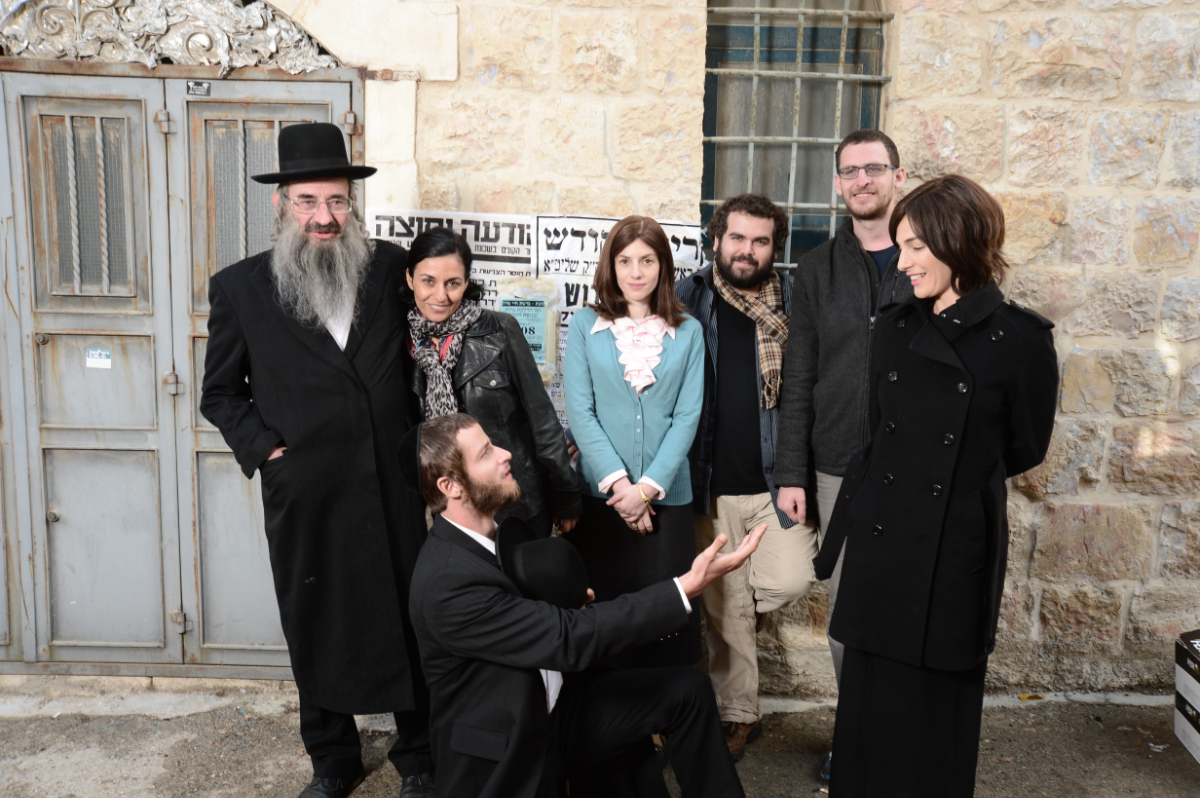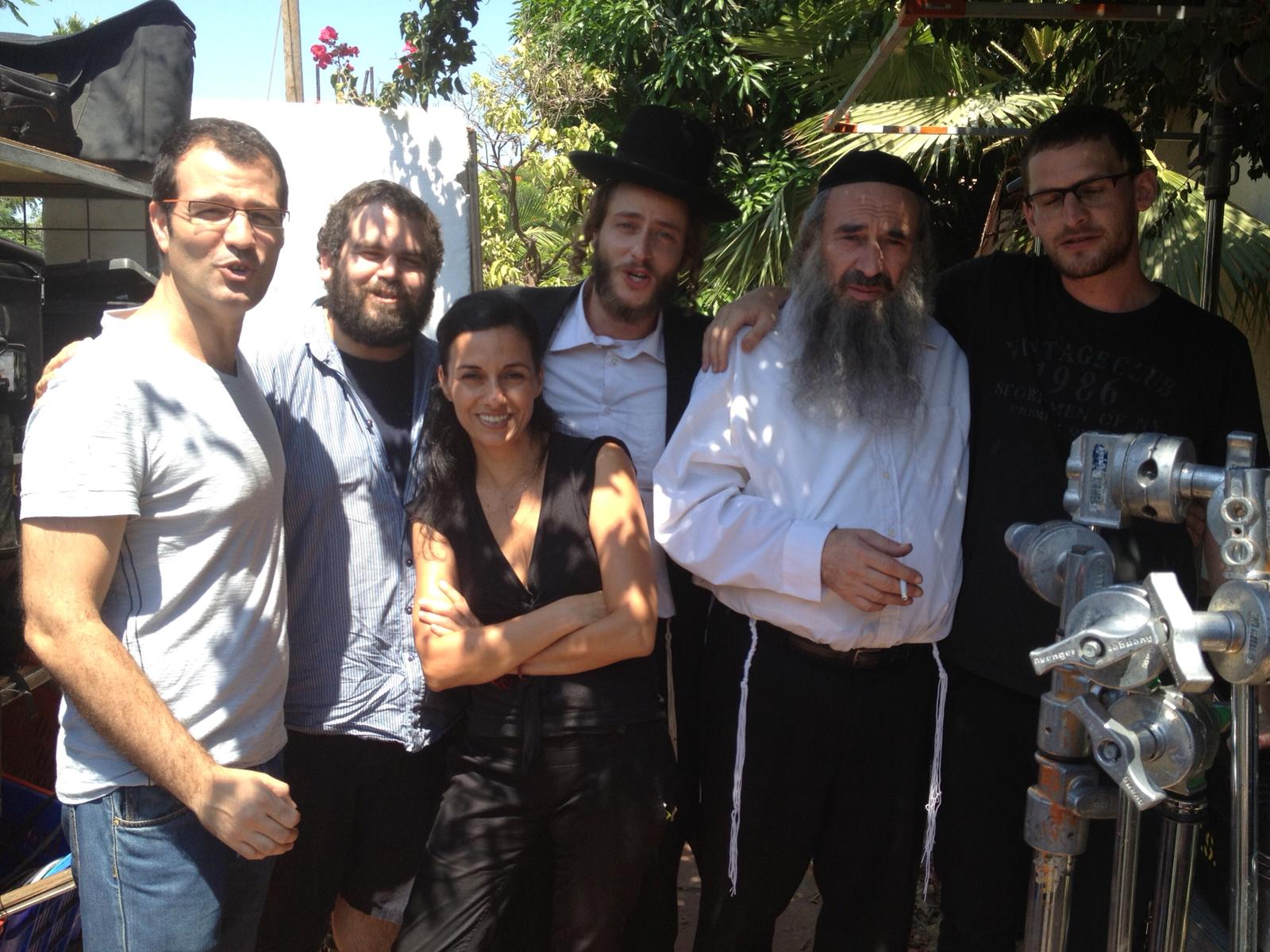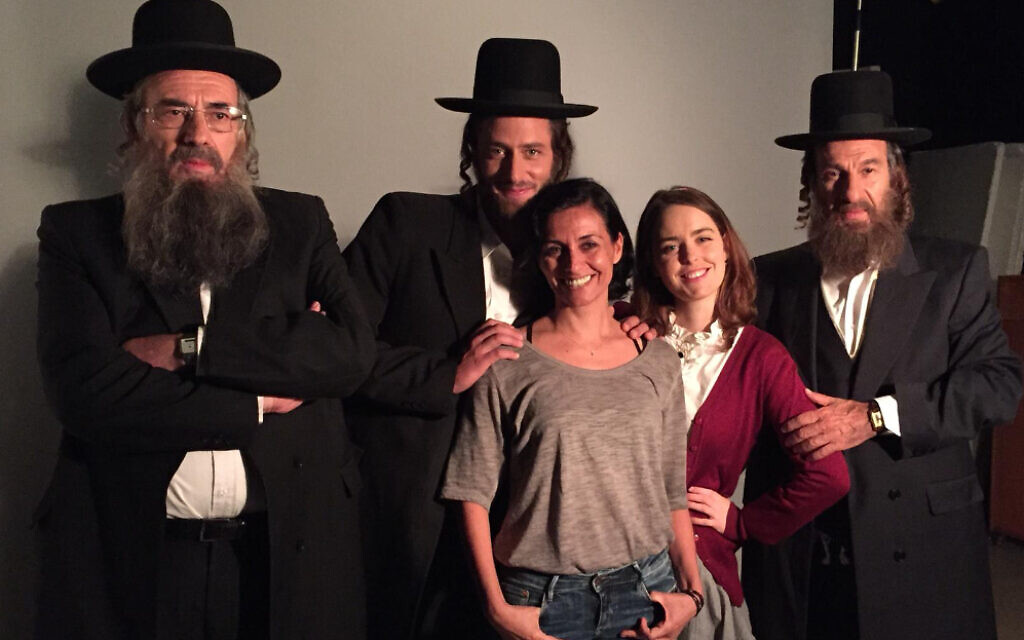Life Magazine: Meet Shtisel producer Dikla Barkai ahead of third series
With the hit series confirmed for another season, Brigit Grant asks the brains behind it what viewers can expect
Location: Ramat Hahayal, Tel Aviv
Interior : Office at Abot Hameiri Barkai. On the wall is a painting of a Charedi boy holding a goldfish in a plastic bag. At a desk sits Shtisel producer, Dikla Barkai
Me: Can we play a game of ‘Hot and Cold’?
Get The Jewish News Daily Edition by email and never miss our top stories Free Sign Up
Dikla: Excuse me?
Me: It’s a kids’game. If I correctly guess a plot line in Shtisel season three, you say ‘hot’
Dikla: You can ask me anything.
Me: Really? But I don’t want to ruin it for thousands of fans. They’re everywhere?
Dikla: Yes, I’m amazed how many have watched it. I’ve heard from people in China. And Brazil.
Me: So you really are doing it ? What about the cast labour dispute?
Dikla: We solved that and we are good. We will shoot in the spring.
Me: So we’ll see Shitsel three at the end of the year?
Dikla: (laughing) Yes, we have started writing and it is really fun. More than fun. I feel very lucky. I have a meeting with the writers Ori (Elon) and Natan (Indursky) after this.
Cut to:
When the producer of your favourite TV series announces that the next people in the room will be its creators, the urge to hide in a closet and eavesdrop is overwhelming. Torn between wanting to know and not, any reveals about the next chapter in the lives of the Shtisel family would be spoilers. It’s funny that Dikla, who has won a slew of Israeli awards for producing Srugim (religious singletons search for mates) and Shtisel (Charedi artist seeks shidduch) thinks of herself as lucky, because the audience feels that finding her shows. Srugim still ranks on Amazon Prime and the one glibly described as a “black-hat soap opera” is the cultural gift that keeps on giving. Thanks to Dikla.
Raised in Petach Tikva, Dikla, 48, convinced an executive at the Israeli television company Yes that Elon and Indursky’s script about Mea Shearim’s strictly-Orthodox community was brilliant, which was tricky in a country fraught with religious versus secular tension. But they bought it.

With an Iraqi mother and Moroccan father, and grandparents who were new émigrés, Dikla was raised secular and knew little of the Charedi world. That world is currently the focus of her working life, so has it changed her?
“I’ve always felt spiritual and my faith lives inside me, but am I closer to it?” she ponders. “I’m not sure. I’ve shed all my prejudices and feel a close connection to the society I never understood. I also think Shtisel has made us all a bit more tolerant. I just wish I could do more work that brings people closer together. Sometimes it’s hard to be a producer.”
But she has managed it since 2002, producing numerous series, a film – A Summer Story – and documentaries while developing a sixth sense for scripts that touch souls. Take the Shtisel moment when Shulem (Dov Glickman) buries his face in the scent of his dead wife’s clothes or when his indignant brother Nuchem (Sasson Gabai) conducts an imaginary orchestra from the balcony as Mahler’s fifth plays in his head. To create such emotion with a single act brought Dikla to a story that has won hearts and minds internationally.

“The new tech world is interesting to us, but eventually we look for a series about ourselves,” she surmises.
In Elon’s The Conductor, Dikla’s most recent series, Lior Ashkenazi plays an acclaimed musician who leaves New York to return to Petach Tikva, where he resorts to conducting the local amateur choir to reconnect with his father.
“It got the most emotional reaction in Israel – more than Shtisel,” Dikla volunteers. “People felt it was about them, particularly as it features songs from their past.” Once again, the themes of life, death and longing has made The Conductor ripe for a remake and there is big interest across the pond. Dikla is already engaged in development for the American market, but is in the “I don’t know” phase about relocating. She has two sons, Tomer, 19, who is in the army and Ori, 17, both of whom are honest critics. “I show them versions of the edits and can tell from their faces if things are improving.”
Modest about her contribution to Shtisel, she admits: “When I read the script in the very beginning, I said there were not enough women. From that Ruchama Weiss (Shira Haas) was born.”
Dikla talks about Giti’s (Neta Riskin) daughter as though she were her own. “She is very special. So individual. She goes all the way with her dreams and desires, yet stays loyal to her community. It is amazing her character is written by two men. They know something about a woman’s soul.”

The creative process for her prize writers involves meet-ups, walks, talks and visiting museums. “I work very closely with them and also our brilliant script editor, Sayed Kashua, who has so much in common with Ori and Natan.”
An Arab Israeli, Kashua has also created his own series for Israeli TV and as a Muslim provides unexpected joy in this very Jewish show.
But Dikla is frightened about season three.
“When you do something so good and get this reaction, there is an expectation. You get fearful.”
Known as third album syndrome, musicians are familiar with the dread that follows big success.
“You think you can’t do it,” says Dikla, but there is no doubt she can. I never reached “hot’ with my plotline guesses, so can only reveal:
“There will be new characters”, and “Akiva will still be painting” with ‘his work’ created by ‘goldfish boy’ artist Alex Tubis.

“He doesn’t know it yet and I need to ask him,” says Dikla, who feels the Charedi boy in the painting looks at her differently every day. “I love it,” she adds.
Ori and Natan are due soon and in our last few minutes, Dikla reflects on how different Shtisel is to other shows, notably its restraint – as not a hand is held or kiss exchanged. “Natan has taught us there are many ways to experience love. In the show, Shulem tells Akiva: ‘I never told your mother I loved her,’ but when he touches her hair in the painting, it’s a different way of saying I love you.”
“So will there be love in season three?” I ask in haste. Dikla smiles. “What do you think, Brigit? What is Shtisel without love?”

Thank you for helping to make Jewish News the leading source of news and opinion for the UK Jewish community. Today we're asking for your invaluable help to continue putting our community first in everything we do.
For as little as £5 a month you can help sustain the vital work we do in celebrating and standing up for Jewish life in Britain.
Jewish News holds our community together and keeps us connected. Like a synagogue, it’s where people turn to feel part of something bigger. It also proudly shows the rest of Britain the vibrancy and rich culture of modern Jewish life.
You can make a quick and easy one-off or monthly contribution of £5, £10, £20 or any other sum you’re comfortable with.
100% of your donation will help us continue celebrating our community, in all its dynamic diversity...
Engaging
Being a community platform means so much more than producing a newspaper and website. One of our proudest roles is media partnering with our invaluable charities to amplify the outstanding work they do to help us all.
Celebrating
There’s no shortage of oys in the world but Jewish News takes every opportunity to celebrate the joys too, through projects like Night of Heroes, 40 Under 40 and other compelling countdowns that make the community kvell with pride.
Pioneering
In the first collaboration between media outlets from different faiths, Jewish News worked with British Muslim TV and Church Times to produce a list of young activists leading the way on interfaith understanding.
Campaigning
Royal Mail issued a stamp honouring Holocaust hero Sir Nicholas Winton after a Jewish News campaign attracted more than 100,000 backers. Jewish Newsalso produces special editions of the paper highlighting pressing issues including mental health and Holocaust remembrance.
Easy access
In an age when news is readily accessible, Jewish News provides high-quality content free online and offline, removing any financial barriers to connecting people.
Voice of our community to wider society
The Jewish News team regularly appears on TV, radio and on the pages of the national press to comment on stories about the Jewish community. Easy access to the paper on the streets of London also means Jewish News provides an invaluable window into the community for the country at large.
We hope you agree all this is worth preserving.
-
By Brigit Grant
-
By Laurent Vaughan - Senior Associate (Bishop & Sewell Solicitors)
-
By Laurent Vaughan - Senior Associate (Bishop & Sewell Solicitors)
-
By Laurent Vaughan - Senior Associate (Bishop & Sewell Solicitors)
-
By Laurent Vaughan - Senior Associate (Bishop & Sewell Solicitors)






















